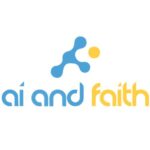The growing number of AI-enabled Church Management Systems has raised awareness and renewed concerns around the use of AI in the church, and particularly AI-powered analytics of congregants’ data.1 These concerns add fuel to the fire of polarization of perspectives on AI in the church. Some who hold that AI is an ‘idolatrous threat’ see these advancements as a confirmation of the evils of AI, while overlooking the benefits congregants have already experienced and the immense future opportunities with AI’s growing capabilities. Others who see AI as a ‘providential tool’ argue that critics exaggerate the negative and present edge-case what-if scenarios around those same opportunities. Rather than adding fuel to the fire, we at AI and Faith and the budding AI Trust and Accountability Consortium (AITAC) are seeking to promote a wise middle ground that enables the effective and biblically based ethical use of these growing AI capabilities.
These trends highlight why AITAC’s proposed certification and accountability framework is needed now more than ever. Instead of rejecting beneficial AI innovations or minimizing the concerns with current practices, AITAC, currently under development, offers a balanced path that preserves the benefits of AI-powered ministry tools while establishing, monitoring, and certifying the use of essential Christian ethical guardrails.

The Challenge: Innovation without accountability
One of the troubling concerns is that well-intentioned churches and their leaders are applying technology that has evolved into sophisticated analytic systems without the necessary level of transparency or meaningful consent from their congregants. Data collected for one purpose could be mined and used for purposes not originally envisioned nor agreed to by the user.
well-intentioned churches and their leaders are applying technology that has evolved into sophisticated analytic systems without the necessary level of transparency or meaningful consent from their congregants.
The powerful data engines in many faith-based AI applications harvest and collect large amounts of data from congregants in churches using them. Beyond collecting vast amounts of data, the algorithms within these applications and the software models on which they are built, analyze the data in ways seldom understood by users, nor sometimes even by the application creators. For instance, information provided on prayer requests could be interpreted by some AI systems as mental health indicators, which would surprise many users just seeking prayer.
The potential of having all this information on an integrated platform, put together with other public information, provides an opportunity for church leaders to target actions for proactive pastoral care or commercial use. Much of this may happen without the awareness of the congregants or their meaningful consent regarding how their data is used.
Importantly, this is not a story of how inherently evil the technology is, but that this powerful technology could, without the necessary checks and balances, be deployed with inadequate ethical frameworks and guardrails.

AITAC’s Response: Structured ethical frameworks, not rejection
While several aspects should be considered and addressed, we highlight two in particular:
Standards-based Certification (instead of Prohibition)
One approach would be to choose never to use AI technology in the church environment. We see this as unnecessary and counterproductive; instead, our approach is to use our biblically-based TRUST framework2 to embed Christian ethical approaches along with the application of internationally accepted standards, like those of IEEE’s ethically aligned design3 and the P7000 series of standards,4 built into the CertifAIEdTM process as a way of providing and certifying the guardrails that these organizations need. The technical standards will ensure robust data governance, appropriate privacy protections, and the necessary security measures; the ethical framework reinforces Christian principles of human dignity, transparency, and good stewardship. To both of these we add the accountability mechanisms of independent assessments and ongoing monitoring.
All these coming together will support responsible innovation that serves human flourishing and Christian missional endeavors, while preventing exploitation and manipulation.
Transparency as a Core Requirement
A core biblical principle is loving and honoring one another. This constrains church leaders to operate their organizations and systems in a way that is fully transparent, and allows congregants and users to know exactly how their data is being used and to be offered the option to opt in or out of providing their data or being algorithmically assessed. Implementing this requires at least clear disclosures of data collection practices, plain-language explanations of information use, meaningful consent processes, and regular transparent reporting of all use of AI tools that apply data analytics by the organization and its providers.
Necessary Changes for Church Tech Providers
Some immediate actions should be considered: First, an independent evaluation of current practices against accepted and emerging international standards on the ethical use of AI is needed. This could be done through AITAC or similar independent organizations. We propose a consortium approach, similar to the Evangelical Council for Financial Accountability (ECFA),5 as the best way to maximize trust and acceptance and to move with the speed and power required by this burgeoning market. Second, there is a need to review the consent and transparency approaches to ensure that they are complete and adequate. Third, technology providers must assess safeguards for vulnerable populations and ensure the appropriate collection, securing, and use of health-related information according to US Federal HIPAA guidelines and similar protections.
Data governance changes should include collecting only the data that is needed for the original purposes of the system and restricting its use to explicitly stated purposes for which consent has been provided.
Data governance changes should include collecting only the data that is needed for the original purposes of the system and restricting its use to explicitly stated purposes for which consent has been provided. Implementing oversight is essential, eg advisory boards, and increasing users’ rights and access to their data for review, correction, and deletion.
The Balanced but Urgent Way Forward
We are not advocating rejection of AI tools, opposition to AI’s use in the church and its ministries, or onerous rules; but we are advocating for urgent implementation of biblically based ethical guardrails adequate to guide the responsible use of these highly capable tools. We all absolutely need greater transparency, accountability, and a commitment to the application of international standards and accreditation.
‘We are advocating for urgent implementation of biblically based ethical guardrails adequate to guide the responsible use of these highly capable [AI] tools.’
The use of AI and analytics is already extensively present in the church. The question is, are we going to continue to use them in a way that honors God and serves the people God has placed in our care?
We hold that it is not a choice between powerful technology and ethical practice; instead, we seek to demonstrate a better way forward that rejects this unnecessary choice. Through collaboration, independent certification, and ongoing accountability, we can have ministry technology that is not only powerful, but principled and supportive of God’s great kingdom ends.
Now is the time to act!
Endnotes
- For example, globenewswire.com/news-release/2025/08/13/3132640/0/en/Pushpay-Announces-its-Approach-to-Artificial-Intelligence-and-Unveils-AI-Fueled-Product-Enhancements-at-its-Customer-Connect-Event.html, thestudioc.org/analytics/, cdn.triumph.tech/resources/unlocking-ai-powered-insights-on-person-profiles-in-rockrms, and kingdommetrics.com/, and ministryai.ai/.
- AI, Ethics, and Trust: A Biblically-Grounded Christian Position
- standards.ieee.org/wp-content/uploads/import/documents/other/ead1e.pdf
- standards.ieee.org/industry-connections/activities/ieee-global-initiative/
- ecfa.org/

